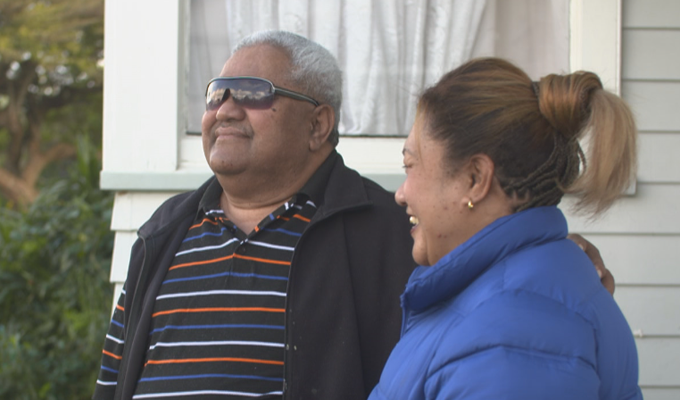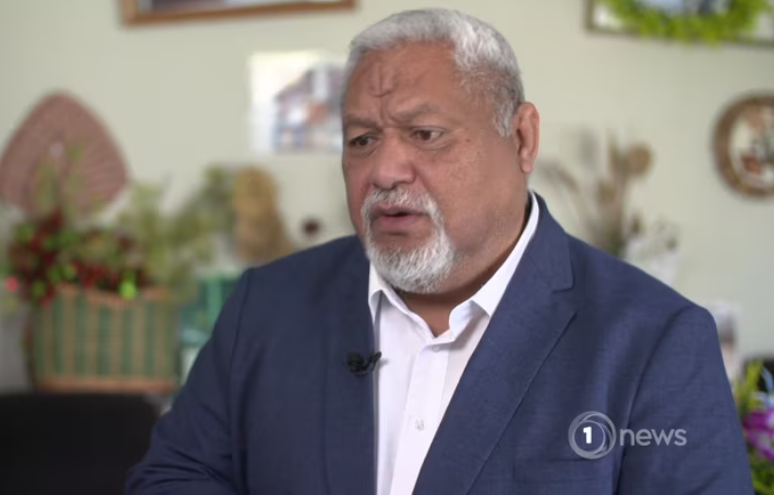By 1news.co.nz
A Tongan woman who cares for her blind husband has been given a six-month visa in an abrupt turnaround by officials after 1News revealed she faced deportation because INZ didn’t believe their marriage was legitimate.

Last night, 1News reported on the plight of Mele Langi, who has been at odds with officials for years about her immigration status. Her husband of six years, Alamoni, is a New Zealand resident and relies on her as a companion and caregiver.
Alamoni has been blind since the age of 15 and is physically disabled due to a stroke. He says he’d be lost without his wife.
The couple has been fighting for Mele’s residency since their marriage in 2017, but Immigration New Zealand (INZ) said it didn’t believe their relationship was a legitimate one.
But in an abrupt decision today, an INZ spokesperson told 1News the agency had shifted on Mele’s residency status “given the humanitarian circumstances” of the case.
“[W]e have now issued a six months’ visitor visa for Ms Langi. This decision means she is now lawfully in New Zealand and will give her time to submit a residence application before the expiry of her visitor visa.”
The couple’s lawyer Soane Foliaki told 1News that he received the news in a call from officials. He said the couple was “really, really happy” after learning about the six-month visitor visa and that it was ultimately a “great relief” after a “long battle”.
“I’m really, really, really happy about it,” he said.
“It’s been a long battle, but you sort of sit down and take a breath, and you’re exhausted. I feel happy, but also sort of exasperated.”
Foliaki said it had been an “uphill” battle to get the couple’s story heard, and that going public about their plight had been a “last resort” after all other options failed.
“I spoke to them earlier when they got the news that it’s going to be a positive position. She’s really, really happy,” he said.
“One of the issues for them, they said, was that they’re worried about the exposure, even to their own community, by going out publicly.
“These are not things that people are proud to stand up and say, ‘I’m an overstayer.'”
“My advice was you’ve got really no choice. You need to come forward and tell your case to the wider community and the public. And you might find that there’s a lot of sympathy out there for you.”
Foliaki said last night that there is a cultural disconnect between INZ and his Pasifika clients. He said it beggared belief that the large amount of evidence provided by the Langis originally had been ignored.
The pair first met in Tonga in 2016 and reconnected in Auckland the following year when Mele visited New Zealand and was at the same kava event as Alamoni.

A raft of evidence — including at least 36 documents ranging from bank statements, to letters from two church leaders, a neighbour who is a doctor, disability groups, medical authorities and community members all said the Langis are a couple.
Speaking today, he said the Langis would begin their visa application process again in the next few weeks, including finding thousands they needed to apply.
The findings of an INZ review into “out-of-hours compliance visits” will soon be released after the agency launched the inquiry in May. At the time, a Pasifika overstayer was detained following a dawn raid in South Auckland in a visit that shocked advocates.
Deputy Prime Minister Carmel Sepuloni said last month that reports of the dawn raids were “hugely disappointing and uncomfortable” for her.
An INZ spokesperson said the review findings are not expected to be released for another fortnight after the agency receives the report this week.
Immigration NZ changing practices after concerns raised about dawn raid tactics
“We expect to release the report in full within a fortnight of getting it and do not consider that the timeframe between receiving the report and publishing it is unreasonable in the circumstances.”
In 2021, the Government gave a formal apology to the Pasifika community for the dawn raids of the 1970s, where a series of rigorous immigration policies resulted in targeted raids on the homes of Pacific families. The raids often came very early in the morning or late at night and were severe, with harsh verbal and physical treatment.


